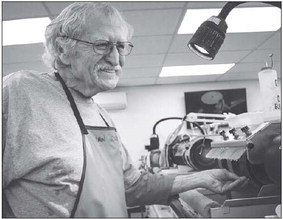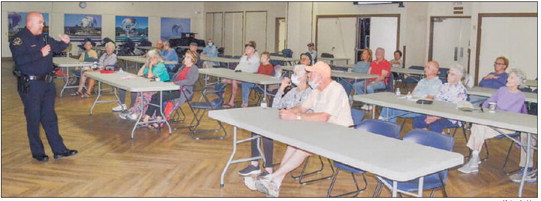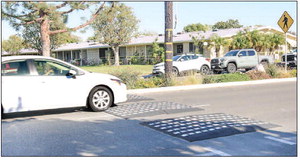At some point, he walked ….


At some point, he walked through a long hallway behind Clubhouse 4 and saw a display case full of glimmering, multicolored glass pendants, intricately woven wire-wrapped stones and polished rocks.
Just across the hall was the home base for the creators of these fine pieces: the Lapidary Club.
“I looked around and I could see the rocks, and I could see the glass,” Beckham said. Confronted with a room full of complex-looking machinery, a Lapidary Club member pointed him toward Dean Jacobus, the president of the club.
Jacobus wasted no time on his new protege. He called over Greg Myers, an “excellent teacher” according to Beckham. Pretty soon, Beckham was cutting, forming, polishing stones all on his own.
“He’s got more spring in his step, even the ladies have mentioned it,” Jacobus said. “He’s much happier here than when he first walked in. He’s got a smile on his face every day he walks in.”
Like Beckham, Jacobus also joined the club as a widower nearly five years ago.
“I have triplets, but they’ve all grown up. I just sort of needed somebody to take care of, so they made me president of the club,” Jacobus said. “So that’s what I do in here, take care of people.”
On Nov. 28, Beckham leaned over an 80-grit rotating rock polisher with a small stone in hand.
Dressed in a rubber apron, he shifted his hands with precision; blunted edges became rounder, the stone’s natural hues grew more prominent.
“I was so tied up with my wife, I had never looked at anything outside of that,” Beckham said. “[Lapidary] is really interesting. You can make things and you can make them quick. You can produce something in one day, two days, and get results. That’s what I like about it.”
In the corner of the room, women use wire to transform polished stones into ready-towear pendants. Others crane their necks toward humming machinery, slowly shaping gems into finished jewels. On a nearby table, people fuse colorful strips of glass to create radiant blue-green pendants and decorative plates. Jacobus sat alongside them, ready to pounce on any opportunity to assist new members.
“Some clubs only meet once or twice a month, we’re here six days a week. We’re even open on Saturday. And once you go through the classes and you’re trained on the equipment, we say, ‘Come in and do free play,’” Jacobus said, describing the club as “day camp for seniors.”
As members busy their hands, they share stories and chit-chat about life. Socialization, Jacobus said, is a vital part of their community.
“We bond as a special group here. If people don’t come in for a couple days and we know they’re a regular, we give them a call on the phone. It’s a very caring group. We sort of adopt people,” Jacobus said. “It’s like ‘Cheers.’ This is a family.”
To illustrate his point, Jacobus pulled out a scrapbook. In it were individual and group photos of a club member who was recently transferred to a memory facility. On the final page of the book, signatures mingled next to messages of well-wishes, speckled across the page like a high school yearbook.
The group plans to drop off the scrapbook to the former club member in the coming weeks—a testament to the club’s dedication to its community.
His advice to residents: It’s not too late to be surprised by the joy of a new horizon.
“Don’t sit at home, you don’t have to. There are options for you. Maybe it’s learning another language, maybe it’s doing genealogy, maybe it’s ceramics, maybe it’s art.
“Maybe it’s here, and maybe it’s not. The message is: come on out and do something.”


